Messiah Lutheran Church is a community of believers who have a love for the Word of God, a strong desire to live out our faith in Christ individually and collectively, and a deep appreciation for the historical dimensions of the Church, especially the beautiful heritage handed down through the Lutheran Reformation of the 16th century.
We do not cater to the popular culture, which by its very nature is transitory, unstable, and ultimately unsatisfying, but to the bedrock issues that transcend all cultures – truth and the lie, sin and grace, God and Satan, this age and the age to come.
We do not believe that worship is a proper time to separate the family (children’s church), but to bring the family together to hear the Word and to sing the praises of God with angels, archangels and all the company of heaven. We are not ashamed to be called “church” or to look like “church” because we honor those faithful men and women who confessed the Gospel and transmitted the faith through the centuries to us, and because Christ has united us with them in baptism. We are not trying to build castles in the sand, but to be an instrument of God’s grace to build houses on the Rock which is Christ.
We believe that training and preparing the next generation of Christians to face the challenges of the future is a high priority for the Church today. We have invested heavily in educational institutions to that end. Messiah Lutheran Classical Academy (MLCA) is a Lutheran school that uses the ancient and proven classical curriculum to educate children from two years old through eighth grades, with hopes of adding a high school in the future. We also offer Sunday School classes, Vacation Bible School, and youth programs in our Church.
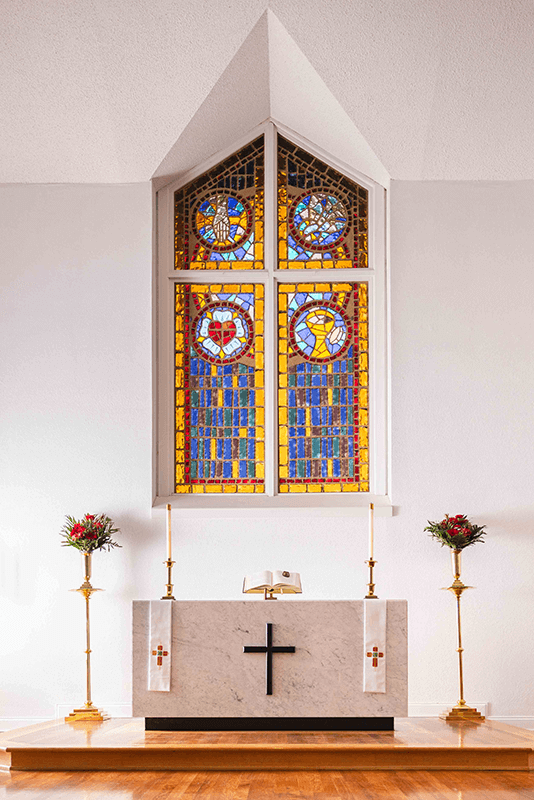
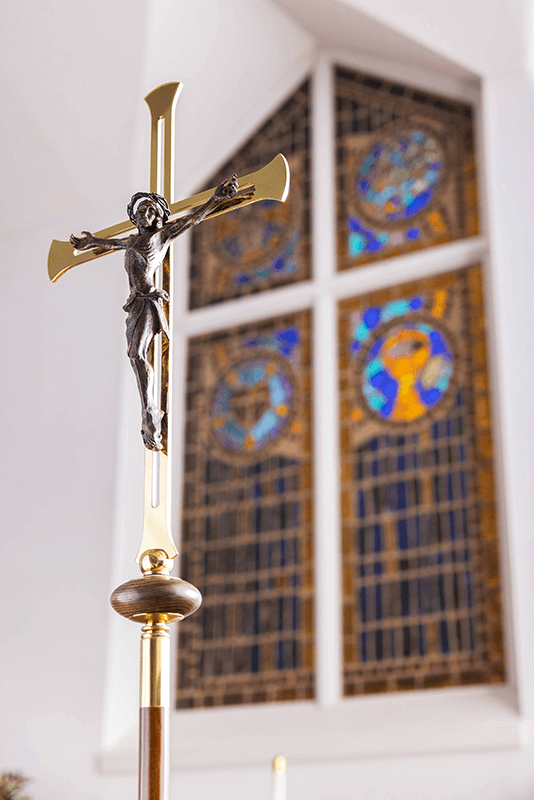
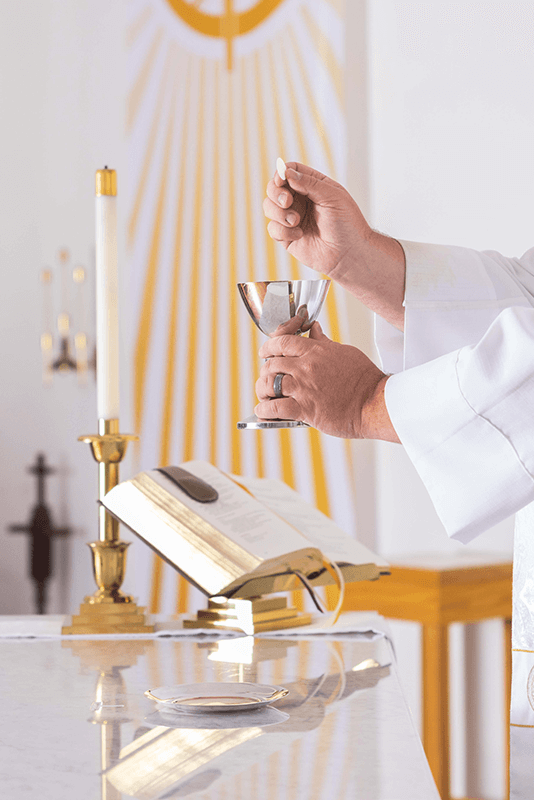
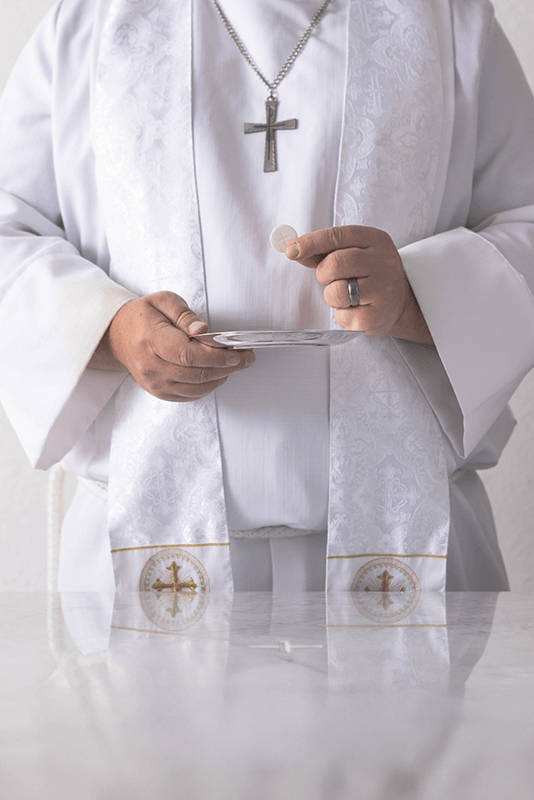
Messiah strives to be a stable rock in the midst of a raging sea of change. We believe that the transforming love of Christ is the power of the Christian life, and His Word is the light that leads us safely through this world to our heavenly home. We welcome you to journey with us as we follow the voice of the Good Shepherd.
With the whole Christian Church throughout all ages, we worship the Triune God: Father, Son, and Holy Spirit, three distinct persons in one divine being, coequal and coeternal. The Father created all that exists and continually sustains His creation and provides for His creatures. Jesus
Christ, the Son, became a human, was born of a virgin, and suffered and died for the sins of all people. His resurrection to life again on that first Easter Sunday was the sign of His ultimate victory over sin, death, and Satan. The Holy Spirit, sent by the Father and the Son, creates and sustains faith through God’s Word and sacraments. This Trinity is the one and only True God (Deuteronomy 6:4, Matthew 28:19, 1 Corinthians 8:4, 2 Corinthians 13:14).
Our teachings can be summed up in one phrase: Grace alone, Faith alone, Scripture alone.
Grace Alone: God created a perfect world and two people, Adam and Eve, without sin. When they, in pride, disobeyed God’s command, they brought death and corruption to all of mankind and all of creation (Genesis 1—3). Consequently, all people are sinners who are accountable from birth for the sin they are born in and the sins they commit, and the wages of that sin is death (John 3:5-6, Romans 3:9-10, Romans 6:23). None of us is righteous, and none of us deserves God’s kindness, (Romans 3:10—18) but God, in His mercy, sent His Son, Jesus, into the world to save the lost. We are chosen by Him, not out of merit, but solely out of grace.
Faith Alone: Jesus Christ, the Son of God, true God and true man, lived a sinless life in our stead (Galatians 4:4– 5). On the cross He took upon Himself the sins of the world, made full payment for them, and won forgiveness for all (Isaiah 53:4—5, John 1:1—14, R o m a n s 5 : 1 9 , 2 Corinthians 5:21, 1 Peter 2:24). All those who believe in Him will receive eternal life (John 3:16). This life is a gift of God. We cannot earn it by performing good works or living our lives in a certain way. It comes only through faith in Christ (Romans 5:6-8, Romans 3:23-24, Ephesians 2:8-9).
Scripture Alone: The Bible is the Word of God. By this we mean that God the Holy Spirit gave to His chosen writers the words they were to write, thus making the Bible God’s own Word and the Truth, without error. This applies to everything written in Scriptures. It is thus the sole rule and norm for all our doctrine (2 Peter 1:21, 2 Timothy 3:16-17, 1 Corinthians 2:13). Jesus, the Savior of the world, is the heart and center of the Holy Scriptures. Through this Word, the Holy Spirit brings forth faith (John 5:39, John 20:31, Acts 10:43, Romans 10:17, 2 Timothy 3:15).
Jesus graciously comes to us today through His Word and Sacraments.
In the waters of baptism we are washed clean— our sins are forgiven, and the Holy Spirit bestows on us the gift of faith. This is entirely the work of God and not our own. We baptize infants, for they are also in need of God’s grace and forgiveness and are able to believe through the gift of the Holy Spirit (Matthew 29:19—20, Acts 2:38—39, Romans 6:3, 5, Galatians 3:27).
In the Lord’s Supper, or Holy Communion, our Lord invites us to His table. We believe that when Jesus said, “Take, eat, this is my body…” and “Take, drink, this is my blood…” He meant what He said. When the Pastor says the words of institution, as recorded in the Gospels of Matthew, Mark, and Luke and in 1 Corinthians, the bread and the wine are no longer just bread and wine but also the body and blood or our Lord Jesus Christ, given and shed for us for the forgiveness of sins (Matthew 26:26—28, Mark 14:22—24, Luke 22:19—20, 1 Corinthians 11:17—33).
As confessional Lutherans, we subscribe to the doctrine taught in the Book of Concord.
You can also learn more about our beliefs from the website of our national church body, the Lutheran Church-Missouri Synod.
The story of our evangelical heritage and confession of the triune God is revealed in the rich symbolism of our stained glass window. The window, installed in 1983, is made up of approximately 58 square feet of hand-fabricated, faceted glass set in epoxy.
The downward pointing hand represents God the Father, and refers to His activity in the creation of the universe and all that it contains. The Father’s benevolent hand is reaching out to man. He sent His Son to redeem us and gives, or sends, the Holy Spirit. Around the hand is a tri-radiant nimbus, which indicates the first person of the Trinity.
The descending dove represents the Holy Spirit as He appeared during the baptism of Christ, descending from the clouds in the form of a dove. Around the head of the dove is another tri-radiant nimbus, this time indicating the third person of the Trinity. The Holy Spirit converts us, preserves our faith, and sanctifies us through the Word of the Gospel and the Sacraments.
The coat of arms (or seal) of Luther: A black cross is placed in a red heart to remind us that faith in the crucified Jesus saves us. This heart is in the midst of a white rose, a symbol of that faith, which gives joy, comfort and peace. The heart and rose are placed in a sky-blue field to denote that such joy of faith is a beginning of the future heavenly joy. And finally, the ring around this field symbolizes the eternity of heaven – the blessedness that lasts forever and has no end, and is precious beyond all material joy and blessing.
The unleavened bread and the chalice, containing wine, represent the Sacrament of the Altar, or the Lord’s Supper. The earthly elements in this means of grace are bread and wine, the heavenly elements are the true body and blood of our Lord Jesus Christ. We believe both are received in an incomprehensible, supernatural manner by those coming to the table.

The small circles are symbols of the eternity of God, having no beginning and no end. They also symbolize perfection, completeness, continuity, and the eternal life of a Christian. The large circle links the symbols and the cross, and sets forth the unity of God and His Church.
The Latin cross is the main focal point of the window, the part of the frame that draws everything together, just as it is the central and focal point of our faith. It is the instrument of death on which our Savior died, and the most significant and eloquent symbol of Christianity. Jesus Christ, Son of God, and the second person in the Trinity, became a man, born of the Virgin Mary, and suffered and died for the sins of all the people of the world. He defeated sin, death, and the devil in His resurrection from the dead, ascended into heaven, and will return on the last day to gather all believers into everlasting life with Him in heaven. “For I resolved to know nothing, while I was with you except Jesus Christ and him crucified.” – 1 Corinthians 2:2
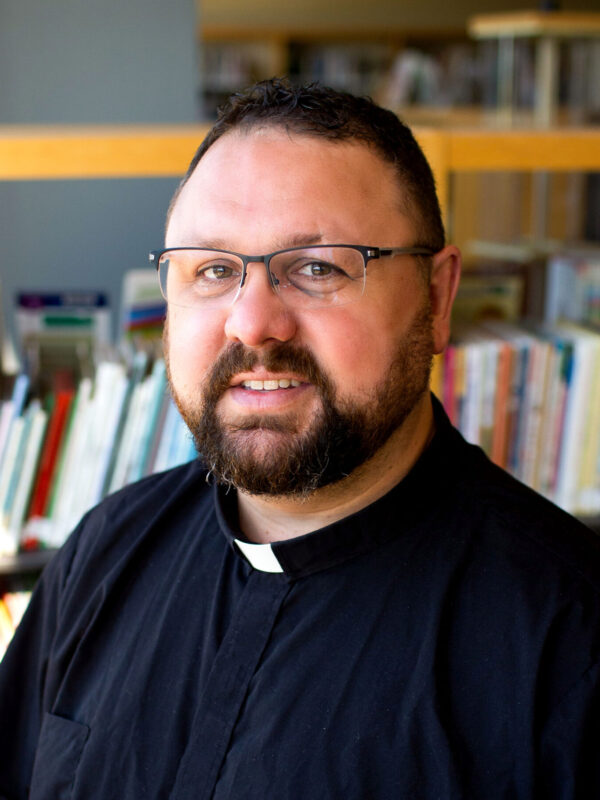
Rev. Tom Chryst, Senior Pastor
Pastor Chryst was installed at Messiah on May 17, 2015.
Pastor Chryst was born and raised in Baltimore, Maryland, and is a graduate of Concordia Seminary, St. Louis, and Concordia College-New York, where he met his wife Brenda (nee Miert).
Brenda, from Greenwich, Connecticut, has a degree in Social Work from Concordia College-New York and M. Ed. from Concordia University, Portland, Oregon. She currently teaches for Keller Independent School District.
Pastor Chryst was Associate Pastor at Grace Lutheran Church, Racine, Wisconsin for 13 years. He then served as LCMS Missionary to Singapore, where he planted the first LCMS congregation there. After many frustrations in getting a permanent visa, Pastor Chryst was reassigned briefly to LCMS Domestic Missions before accepting the call to Messiah. He also maintains a blog at: http://preachrblog.blogspot.com/
His hobbies include chess and gardening — and he is a fan of hot sauce, J.R.R. Tolkein and the Green Bay Packers. Brenda enjoys cooking, jewelry-making, and making the most of her time with their three daughters.
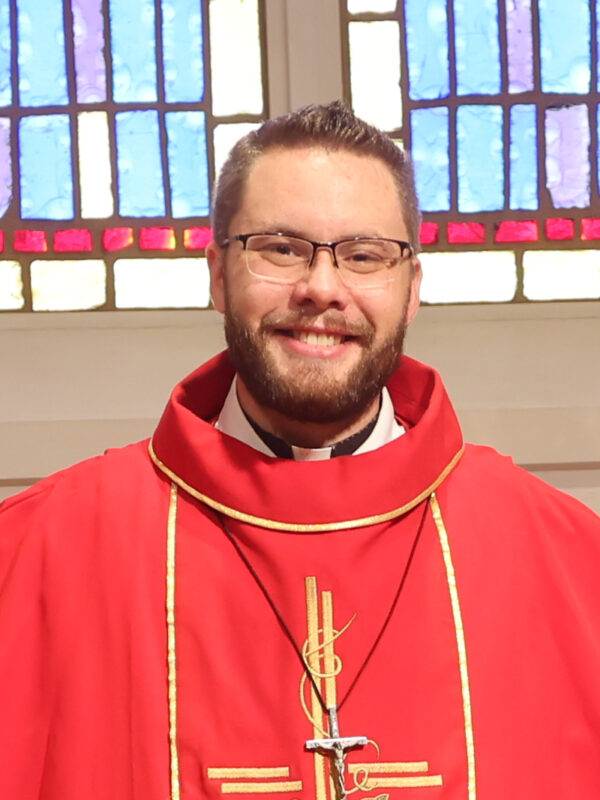
Rev. Brennick Christiansen, Assistant Pastor
Pastor Christiansen was installed at Messiah on August 10th, 2025.
He is a graduate of Concordia Theological Seminary, Fort Wayne, and Concordia University Chicago. He is currently pursuing doctoral studies at the University of Dallas.
Pastor Christiansen has served as Headmaster and Associate Pastor at Peace Lutheran Church in Sussex, Wisconsin, as well as Pastor at Our Father’s Lutheran Church in Greenfield, Wisconsin. Prior to attending seminary, he taught at Faith Lutheran School in Plano, Texas. He loves reading theology, philosophy, pedagogy, music theory, and the theological languages.
Pastor Christiansen and his wife Bethany have five kids. They love singing hymns, playing games, exploring nature, and reading good books.
The Focus
The focus of the Divine Service is the God who loves us, who sent His beloved Son to live and die in our place, who forgives our sins, and who richly provides us each day with all that we need to support body and soul. We are present to hear Him speak through the Holy Scriptures, and receive Christ’s Body and Blood in the Lord’s Supper. It is not our purpose to be entertained, but to receive Him and His gifts, and respond with hymns and prayers, thanks and praise.
We Join The Saints of The Early Church
Our worship is orderly and reverent, which is consistent with the pattern we see in both Old and New Testament worship. The order we use is called a liturgy, and it is of ancient origin. Some of this liturgy has been used in the Christian Church since the days of the apostles. The words spoken, the chants sung and the responses made are taken almost verbatim from the Bible. What better way to worship our God, than using His own words, which are far above anything man could invent?
The liturgy is like a drama; it has a theme and a direction. The congregation is not an audience, but a participant in this sacred drama. We enter into God’s presence with an acknowledgment of our sin, receive His announcement of forgiveness through Christ, hear His Word through the Scripture readings and sermon, praise Him with our offerings and prayers, and finally receive His presence most intimately in the celebration of the Lord’s Supper. We depart with the blessing God Himself gave through Moses to be pronounced upon His people. From the Invocation to the Benediction, we stand consciously in the wonderful and awesome presence of the living God.
A Note on Our Church Music
Lutherans have always been very careful with the music we use in worship. We are aware that some of it “takes some getting used to,” but there is a reason for that. The music is always to be subservient to the Word – we don’t want it to distract from the message by calling attention to itself. Our music, therefore, does not fare well by popular standards of entertainment, but it wasn’t designed by those standards. It was designed to exalt our Lord, not stir up subjective emotions which center on the worshipper. (Although it often does bring up a pure, joyful response in God’s people.) Zeal and enthusiasm for popular music usually subsides with time, but appreciation for good music tends to grow. This is what we look for in church music.
Children & Worship
We love children at Messiah and we love to see them in the worship service. We recognize, however, the challenge that can be for parents. Don’t worry about the occasional cry, whine, or bump! Most of us here either have small children or have had them and remember it well.
If you have a baby who refuses to be comforted or a wiggly toddler who is absolutely determined to have a loud conversation, you are invited to use our church “cry room” if you wish to. It is located just behind the sanctuary. As you leave the sanctuary, take a right down the hall. The room has comfortable chairs, windows into the sanctuary, and sound. You can be with your little ones and still hear the sermon and perhaps sing a hymn or two.
Please also see download our Wedding Manual here. This document covers important information about weddings a Messiah.